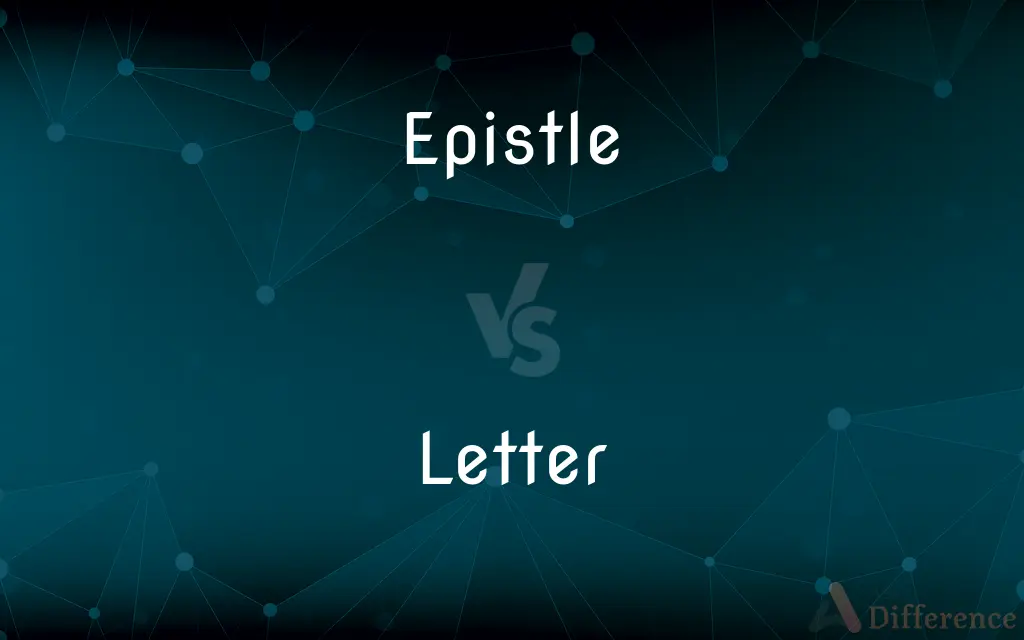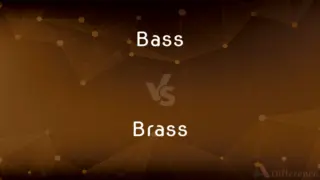Epistle vs. Letter — What's the Difference?
By Fiza Rafique & Maham Liaqat — Updated on March 12, 2024
Epistles are often formal, didactic, or poetic letters in literature or religious texts, whereas letters are personal or business correspondences in everyday use.

Difference Between Epistle and Letter
Table of Contents
ADVERTISEMENT
Key Differences
Epistles are typically found in religious or literary contexts, often intended to convey moral teachings, theological doctrines, or poetic expressions, whereas letters are more commonly used for personal, business, or official communication. Epistles, such as those in the New Testament, are formal and structured, aimed at a broader audience or specific community, often addressing complex themes or offering guidance. Letters, on the other hand, are usually direct and personal, tailored to the recipient's specific circumstances, interests, or needs. They can range from informal notes between friends to formal business or official correspondences.
While epistles are often preserved as part of religious or literary canons, valued for their historical, moral, or aesthetic significance, letters may be kept for personal sentimental value, legal reasons, or historical documentation. The formality and purpose of epistles distinguish them from the more flexible and utilitarian nature of letters.
The language and style of epistles are usually more formal, elaborate, or stylized, reflecting their literary or religious aims, whereas letters tend to be more straightforward and conversational, adapted to the writer's and recipient's relationship. This distinction highlights the different communicative functions and cultural roles of epistles and letters.
Epistles sometimes employ specific literary devices, such as allegory or parable, to convey their messages, making them more than just a means of communication but a form of artistic or philosophical expression. In contrast, letters, even when carefully crafted, prioritize clarity and directness over literary or artistic expression.
Despite their differences, both epistles and letters serve as important tools for human communication, each adapted to its specific context and purpose, reflecting the diverse ways in which people connect, share ideas, and influence one another across time and cultures.
ADVERTISEMENT
Comparison Chart
Context
Often found in religious, literary, or philosophical texts.
Used in personal, business, or official communications.
Purpose
To convey moral teachings, theological doctrines, or poetic expressions.
To communicate personal messages, conduct business, or formalize agreements.
Audience
Broader or specific communities, not necessarily known personally to the writer.
Specific individuals or groups known to the writer.
Style
Formal, elaborate, or stylized, with literary or artistic expressions.
Straightforward, conversational, and adapted to the relationship between writer and recipient.
Preservation
As part of religious or literary canons for their historical, moral, or aesthetic significance.
For personal sentimental value, legal reasons, or historical documentation.
Compare with Definitions
Epistle
A formal or didactic letter, often with a religious or moral theme.
Paul's epistles in the New Testament address early Christian communities.
Letter
A written message from one person to another, usually private.
I received a heartfelt letter from an old friend reminiscing about our childhood.
Epistle
A literary work in the form of a letter addressing a wide audience.
Some of Horace's epistles offer philosophical musings.
Letter
A formal communication in business or official matters.
The company sent a letter of apology to affected customers.
Epistle
A written communication intended for public reading or instruction.
The Epistle to the Hebrews provides theological discourse on Christ's priesthood.
Letter
A literary or historical document valued for its personal insight.
The letters between famous historical figures offer a glimpse into their private lives.
Epistle
A poetic letter, often written in verse, conveying messages or teachings.
Alexander Pope's Epistle to Dr. Arbuthnot critiques contemporary society.
Letter
A brief note for informal communication or reminders.
She left a letter on the fridge reminding her roommate to pay the rent.
Epistle
An open letter, typically addressing broader societal issues or principles.
Martin Luther's epistles were pivotal in spreading Reformation ideas.
Letter
An email or digital correspondence in modern contexts.
He sent a letter of resignation via email to his employer.
Epistle
An epistle (; Greek: ἐπιστολή, epistolē, "letter") is a writing directed or sent to a person or group of people, usually an elegant and formal didactic letter. The epistle genre of letter-writing was common in ancient Egypt as part of the scribal-school writing curriculum.
Letter
A character representing one or more of the sounds used in speech; any of the symbols of an alphabet
A capital letter
Epistle
A letter
Activists firing off angry epistles
Letter
A written, typed, or printed communication, sent in an envelope by post or messenger
He sent a letter to Mrs Falconer
Epistle
A letter, especially a formal one.
Letter
The precise terms of a statement or requirement; the strict verbal interpretation
We must keep the spirit of the law as well as the letter
The officer in the incident got in trouble for following the letter of the law
Epistle
A literary composition in the form of a letter.
Letter
Literature
The world of letters
Epistle
One of the letters included as a book in the New Testament.
Letter
A style of typeface.
Epistle
An excerpt from one of these letters, read as part of a religious service.
Letter
Inscribe letters or writing on
Her name was lettered in gold
Epistle
A letter, or a literary composition in the form of a letter.
Letter
Be given a school or college initial as a mark of proficiency in sport
In high school she lettered in soccer, basketball and softball
Epistle
(Christianity) One of the letters included as a book of the New Testament.
Letter
A written symbol or character representing a speech sound and being a component of an alphabet.
Epistle
To write; to communicate in a letter or by writing.
Letter
A written symbol or character used in the graphemic representation of a word, such as the h in Thames. See Note at Thames.
Epistle
A writing directed or sent to a person or persons; a written communication; a letter; - applied usually to formal, didactic, or elegant letters.
A madman's epistles are no gospels.
Letter
A written or printed communication directed to a person or organization.
Epistle
One of the letters in the New Testament which were addressed to their Christian brethren by Apostles.
One sees the pulpit on the epistle side.
Letter
Often letters A certified document granting rights to its bearer.
Epistle
To write; to communicate in a letter or by writing.
Letter
Literal meaning
Had to adhere to the letter of the law.
Epistle
Especially a long, formal letter
Letter
Literary culture; belles-lettres.
Letter
Learning or knowledge, especially of literature.
Letter
Literature or writing as a profession.
Letter
A piece of type that prints a single character.
Letter
A specific style of type.
Letter
The characters in one style of type.
Letter
An emblem in the shape of the initial of a school awarded for outstanding performance, especially in varsity athletics.
Letter
To write letters on
Lettered the paper.
Letter
To write in letters
Lettered our name on the mailbox.
Letter
To write or form letters.
Letter
To earn a school letter, as for outstanding athletic achievement
She lettered in three collegiate sports.
Letter
A symbol in an alphabet.
There are twenty-six letters in the English alphabet.
Letter
A written or printed communication, generally longer and more formal than a note.
I wrote a letter to my sister about my life.
Letter
The literal meaning of something, as distinguished from its intended and remoter meaning (the spirit).
Letter
Literature.
Benjamin Franklin was multiskilled – a scientist, politician and a man of letters.
Letter
(law) A division unit of a piece of law marked by a letter of the alphabet.
Letter (b) constitutes an exception to this provision.
Letter
A size of paper, 8½ in × 11 in (215.9 mm × 279.4 mm, US paper sizes rounded to the nearest 5 mm).
Letter
A size of paper, 215 mm × 280 mm.
Letter
Clipping of varsity letter
Letter
A single type; type, collectively; a style of type.
Letter
(archaic) One who retards or hinders.
Letter
(transitive) To print, inscribe, or paint letters on something.
Letter
To earn a varsity letter (award).
Letter
One who lets or permits; one who lets anything for hire.
Letter
One who retards or hinders.
Letter
A mark or character used as the representative of a sound, or of an articulation of the human organs of speech; a first element of written language.
And a superscription also was written over him in letters of Greek, and Latin, and Hebrew.
Letter
A written or printed communication; a message expressed in intelligible characters on something adapted to conveyance, as paper, parchment, etc.; an epistle.
The style of letters ought to be free, easy, and natural.
Letter
A writing; an inscription.
None could expound what this letter meant.
Letter
Verbal expression; literal statement or meaning; exact signification or requirement.
We must observe the letter of the law, without doing violence to the reason of the law and the intention of the lawgiver.
I broke the letter of it to keep the sense.
Letter
A single type; type, collectively; a style of type.
Under these buildings . . . was the king's printing house, and that famous letter so much esteemed.
Letter
Learning; erudition; as, a man of letters.
Letter
A letter; an epistle.
Letter
A telegram longer than an ordinary message sent at rates lower than the standard message rate in consideration of its being sent and delivered subject to priority in service of regular messages. Such telegrams are called by the Western Union Company day letters, or night letters according to the time of sending, and by The Postal Telegraph Company day lettergrams, or night lettergrams.
A strange lock that opens with AMEN.
Letter
To impress with letters; to mark with letters or words; as, a book gilt and lettered.
Letter
A written message addressed to a person or organization;
Mailed an indignant letter to the editor
Letter
The conventional characters of the alphabet used to represent speech;
His grandmother taught him his letters
Letter
A strictly literal interpretation (as distinct from the intention);
He followed instructions to the letter
He obeyed the letter of the law
Letter
An award earned by participation in a school sport;
He won letters in three sports
Letter
Owner who lets another person use something (housing usually) for hire
Letter
Win an athletic letter
Letter
Set down or print with letters
Letter
Mark letters on or mark with letters
Common Curiosities
What defines an epistle?
An epistle is a formal or didactic letter, often found in religious or literary contexts, aimed at conveying moral teachings or philosophical musings.
Do epistles have to be religious in nature?
No, epistles can also be literary or philosophical, not necessarily religious, though many well-known examples are from religious texts.
Are emails and digital messages considered letters?
Yes, in modern contexts, emails and digital messages are considered the electronic equivalents of traditional letters.
How are epistles preserved and valued in culture?
Epistles are often preserved as part of religious or literary canons, valued for their moral, theological, or aesthetic significance.
How does a letter differ from an epistle in purpose?
Letters are used for personal, business, or official communication, focusing on direct and specific messages, unlike the broader thematic concerns of epistles.
Who were common recipients of epistles in historical contexts?
In historical contexts, epistles were often addressed to communities, congregations, or the public, rather than individuals.
Can an epistle be considered a personal letter?
While epistles can be personal in nature, they are typically more formal and intended for a wider audience, unlike private letters.
Can letters have literary or historical value?
Yes, letters, especially those from notable individuals or historical figures, can hold significant literary or historical value.
What is the significance of letters in personal relationships?
Letters hold sentimental value in personal relationships, serving as a tangible record of thoughts, emotions, and moments shared.
How do letters contribute to historical documentation?
Letters can serve as primary sources, offering insights into historical events, personal perspectives, and societal norms of their time.
Do epistles always follow a specific format or structure?
While epistles often adhere to formal structures, especially in religious texts, literary epistles might be more flexible in format.
Can a letter be considered an epistle if it addresses broader themes?
If a personal letter addresses broader societal or philosophical themes, it might be considered an epistle, especially if it gains public significance.
Is the style of writing significantly different between epistles and letters?
Yes, epistles often employ a more formal, elaborate, or stylized language, while letters are more straightforward and conversational.
Are all epistles intended for public reading?
Most epistles are intended for public or communal reading, but some might be personal, later gaining wider significance.
How has the role of letters changed with the advent of digital communication?
With digital communication, the role of letters has evolved, becoming more immediate and less formal, but they still retain their fundamental purpose of personal connection.
Share Your Discovery

Previous Comparison
Nickname vs. Surname
Next Comparison
Bass vs. BrassAuthor Spotlight
Written by
Fiza RafiqueFiza Rafique is a skilled content writer at AskDifference.com, where she meticulously refines and enhances written pieces. Drawing from her vast editorial expertise, Fiza ensures clarity, accuracy, and precision in every article. Passionate about language, she continually seeks to elevate the quality of content for readers worldwide.
Co-written by
Maham Liaqat













































